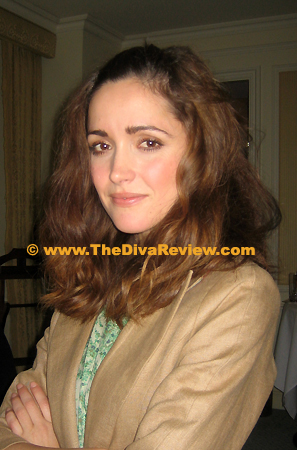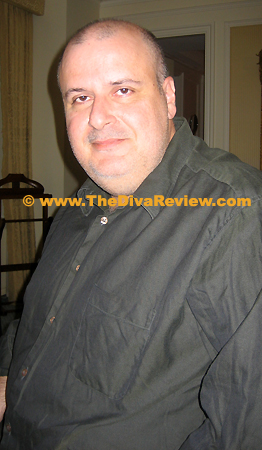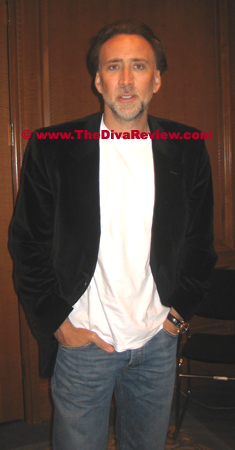
Hey kids, get ready to take a walk on the apocalyptic side with our chat with the stars and director of KNOWING. Nicolas Cage, Rose Byrne and Alex Proyas sat down to talk about the end of the world, Danny Boyle, angels and aliens, and why New York City canít catch a break.
Dig it!
Knowing
Nicolas Cage, Rose Byrne and Alex Proyas
Rose Byrne
 The
Lady Miz Diva: Rose, do you think you would have made the choices that
your character, Diana did in the film?
The
Lady Miz Diva: Rose, do you think you would have made the choices that
your character, Diana did in the film?
Rose Byrne: Well, I definitely can relate to Diana in that sense of Iím not the best at confrontation. I definitely run from things, and I tend to avoid situations. Saying that, Iíve not nearly had the trauma that she had in her life; my mother hasnít told me the day Iím going to die.
In all seriousness, I think anything like that is going to damage someone in a way that is pretty profound. But I had huge empathy for her when I read the script, sheís put in an incredibly hard situation, and sheís trying desperately hard to protect her child and terrified sheís going to turn into her mother. Sheís kind of made of steel. Itís a shame you donít get to see any other side to her, really. I mean that little scene at the start with them in the museum; you see her sort of open up a little bit, but sheís kind of made of steel.
I met with a single parent in Melbourne which was helpful, cos I donít have any children, and she was great and kind of explained the whole world to me, of what itís like, and itís a pretty incredible kind of thing. I definitely had a huge empathy for her when I read the script.
LMD: Would you want to know when your last day was?
RB: No, I donít think I would, no. You know what? It just changes day to day. It depends on what mood Iím in. Today, no! {Laughs} Iíd rather not.
LMD: Has the movie changed your thoughts about putting your life in order before itís too late?
RB: Absolutely, yeah. I mean, you hope that every day you are grateful and tell the loved ones in your life you love them and you appreciate them, and you already have that sense of anything can change at any time.
I mean, itís incredibly fragile, being alive. You forget that all the time. But, I tell you out in Los Angeles, you see so many car crashes; it kind of reminds you all the time, and all the horrible things over the last few months, itís just like, ĎOh my God, split second.í That was quite weird, seeing these events out there that made me feel like, ĎWhoa.í It reminds you of how little time we have, and how fleeting everything is and try to enjoy it while you can.
Anyway, {Laughs} I guess living in the moment is a good thing. I used to see a lot of psychics, and then I realised itís much better to cast away those things and try and just be present. I used to go and treat myself every six months. I saw them everywhere when Iíd be traveling. Iíd see them in America, or in England, or in Europe. I started realising it was a self-fulfilling prophecy. Like the psychic tells you, ďYouíre going to move to New Mexico,Ē and then you move there, and you're like, ĎAm I here because they told me to be here?í You know what I mean?
I think the mystery of not knowing is such a sacred thing in life and a beautiful part of it, and kind of a magical part of it. If I had a baby, I would never wanna know if it was a girl or a boy. I think the mysteries are what we have to hold on to, personally, because we know everything, now. I mean, we all wanna know everything; we wanna know whoís gonna win the election, or whoís gonna be the next Pop Idol, everyone wants to know.
LMD: Can you talk about working with director Alex Proyas? Your character is such a feisty thing, were you allowed to bring your own spin to her?
RB: Yeah, absolutely, heís great to try lots of different things. Heís really open to try it this way or that way. He definitely would like it a certain way, and you do that, but thereís the big ability to move around. He likes actors, I think, heís very collaborative.
We had a great rehearsal process of honing the script, and I felt thankful cos him and Nic had a great dialog and they were instantly comfortable with each other. Heís really sweet and kind, and I think that helps, as well. He sets a good tone for the set, and expects a standard, too. But I think he trusts you and thatís why he casts you.
So, I felt like I did when I worked with Danny Boyle, or Sofia Coppola, or Wolfgang Petersen; I felt in safe hands. And heís obviously a visionary, so it was a thrill. I was like, ĎCool, Iím gonna be in an Alex Proyas movie!í Thatís kind of a kick.
LMD: Well that leads me to ask, heís got such a dark, nihilistic view of the future in his films, is he all gloomy and goth?
RB: But then KNOWING is kinda not like that at all. Itís a bit of departure in that sense and it ends on a far more spiritual note. So, I think itís another side to him that his fans will see.
LMD: What was your take on the meaning of the black rocks?
RB: {Laughs} Well, you know at the end the rocks all rise up; they felt to me like they were just little gifts.
LMD: Angels or aliens?
RB: Well, canít they be both? {Laugh} I thought of it not so much biblical as a spiritual thing, I suppose. I guess I felt it like was more like a new land, more than Heaven, I suppose, for me, but itís a very personal interpretation for each viewer, I believe.
LMD: What do you think people are going to take away from KNOWING?
RB: I think if youíre more religious, you could probably take away a far more religious message. If youíre not, you could not believe the ending, if you will, or you could take away the science of it -- that itís a solar wave -- or whatever. So, I think itís one of the strengths of the film that itíll hopefully foster some sort of dialog about the meaning or theology.
Alex Proyas
 The
Lady Miz Diva: Iíve just spoken to Rose Byrne and asked if after making
films like THE CROW, DARK CITY, and I, ROBOT, whether you actually were goth
and gloomy?
The
Lady Miz Diva: Iíve just spoken to Rose Byrne and asked if after making
films like THE CROW, DARK CITY, and I, ROBOT, whether you actually were goth
and gloomy?
Alex Proyas: I was once in my younger, more svelte years. Now, Iím just a relaxed kinda guy.
No, cos Iím Australian, it kind counteracts it. We donít take ourselves too seriously. Try not to.
LMD: Would you want to know when your last day was?
AP: I would wanna know, yeah. If a doctor said, ĎI have very bad news, you only have a short time to live,í youíd of course wanna know what that short time was, yíknow? So, a lot of people say they donít wanna know, but I believe that curiosity would get the better of you. And I believe that if it was in a situation like the movie, where you knew that something was gonna happen and you thought maybe you can affect it, or maybe you can stop it happening, or save some people, of course, I think people would try act on it in some way, in their own way.
LMD: Did the film's moral of making peace and getting your life sorted before itís too late occur to you in your own life?
AP: Sure! Yeah, I mean thatís an interesting perspective, but for me itís more about the quest for meaning that heís {Nicolas Cageís character, John Koestler} on.
He believes the universe is a random sequence of events, you know? And he wants to try and find meaning in the universe; itís really important to him, purpose, and heís on a quest to find that. By the end of the film, he kind of finds his own version of it.
And, in fact, you can interpret that in many different ways; it could be a big metaphysical thing, or it could just simply be. Heís really just discovered being a dad, and the point of all the stuff that happens at the end of the film that we canít go into too much detail about: The handing of the mantle to the next generation, and the notion that just being a father to your son is enough. Thatís a meaning, thatís purpose, you know? So, I think you can see it many different ways.
LMD: What was it like to work with Nicolas Cage?
AP: I really love working with Nic and I hope we can do it again, actually. Iíve just liked his work forever. Weíre about the same age, so Iíve watched him do all this stuff over the years.
I just thought he would be the perfect guy for this role; thereís a great combination of passion and thoughtfulness that he brings to the character. I knew he would. I knew he would come up with something really cool for this guy, and it was really fun to see that happen. And I just genuinely enjoyed collaborating with him and hanging out with him, I think weíre sort of very like-minded in many ways.
LMD: You allowed him to do his own take on this character?
AP: Well, they donít just turn it on, you know, it comes out of a lot of discussion. I really believe in the rehearsal process, and I try to get my actors for as long as we can before we start shooting the movie. And we just sit in a hotel suite, around a table, and just go through the script, and read it and just talk it through.
We just basically talk about backstory. In this case, we discussed the whole construct of the film, and Nic really embraced that part of it, you know? And then you evolve; itís kind of fun because you see the character start to build through the room. I mean, some actors come into it with a very clear idea; a very specific idea, and I have my own ideas, but itís about that collaborative process, and through that the characters are constructed.
LMD: Before we leave casting, can you talk about Chandler Canterbury and Lara Robinson, the two children in the film who give great performances?
AP: Thank you. Yeah, theyíre great kids. We cast a very wide net for the kids, and I was really looking for kids who werenít acting, you know? Because sadly, a lot of children -- particularly the more experienced ones -- often they do so many TV commercials, and they learn all these sort of bad techniques, so I was just trying to find kids that were very real.
That was the thing about the whole cast; we were going for a very natural feel that felt very realistic, and these kids were just terrific. They were very bright, as well, which I think really helps, and they had a great sense of imagination. They worked out very well.
LMD: Not only are you directing KNOWING, but youíre producing it, as well. Do you have to separate those two positions while youíre on set directing?
AP: Itís part of the same job, yíknow? Iím quite fiscally responsible; some directors arenít, I am. Iím particularly fiscally responsible when Iím working with a studio that entrusts me with that and actually supports me in the proper way. And when they donít Iím terribly irresponsible; so, thatís partly the job of the producer.
But itís also when youíre making or directing a movie, you work very for long hours and you lose a certain sense of objectivity, sometimes, you know? As a producer, you have to try and retain that objectivity, so there is a little bit of a balance to be made there, but I find they go well together.
LMD: Well, how did you make that subway sequence inexpensively?
AP: It wasnít inexpensive {Laughs}. I wish I could make it inexpensively! You agree on a budget, you try and stick to that budget and you try not to let the project go out of control, within reason.
Sometimes, you just have no control over the situation: Like the plane crash sequence in the movie, that was something I wanted to do it in one shot, and I knew that would be very complex to do, cos it takes so long to reset each time you do a take, and we had all sorts of camera problems on that. And I had two days to shoot this one three-minute shot, but it was so complicated to do. And we had all sorts of issues and none of the takes were working, and we got to the end of the second day and I honestly thought we werenít gonna get it. I actually had to call the studio and say, ďGuys, itís not gonna happen. Weíre gonna have to come back tomorrow,Ē and it was a very expensive day, because it was such a big crew and hundreds of extras.
Then miraculously, it all came together, and it all worked, just at the very last moment. So, I called them, and it was like everyone had suddenly won the lottery, cos they love it when you tell them they don't have to spend more moneyÖ
LMD: Is it a cinematic rule that any film involving the end of the world has to involve New York City?
AP: New York is this iconic city that kind of represents all cities, in a way, and I think thatís why itís been destroyed in so many cities, you know?
LMD: Give us a break!
AP: {Laughs} Yeah. Look, I love New York City; itís such a beautiful city to destroy cinematically, you know? Sadly, I think itís gonna keep getting destroyed.
Nicolas Cage
 The
Lady Miz Diva: Even though the movie is about the possible end of the
world it's still a positive film. The story shows how you need to live
each day to the fullest. Were you affected at all by the moral of the
story?
The
Lady Miz Diva: Even though the movie is about the possible end of the
world it's still a positive film. The story shows how you need to live
each day to the fullest. Were you affected at all by the moral of the
story?
Nicolas Cage: Well, first of all, any opinion I give is not as important as your opinion. Your opinion is what matters to me, and so if that's what you took from the movie, then that's absolutely correct. Any awakenings that I may have had happened before I said yes to the movie. So, I didn't really learn anything, or get anything from it; I was just ready to express it.
LMD: Alex Proyas talked about how he valued a long rehearsal process and insists on it with his actors. Does that help you, too? Did Alex allow any improvisation, or allow you to put your spin on things?
NC: Yeah, I generally do enjoy the rehearsal process, because that's where you can share your ideas, get your thoughts and feelings out, and see whether or not they're going to land; whether or not people agree, particularly the director.
So, you can sort out in that process any elements that need to be sorted out before you're on the set, and of course that saves time and it also makes everyone more comfortable working together.
Yes, Alex is the sort of director that's open to suggestions and makes you feel comfortable, and relaxed enough to be able to create. It's quite liberating, and he was open to various ideas.
LMD: Youíve done so many films across so many genres, is there any particular genre of film that you are particularly our fond of; that stretches your acting muscles more than another? Is there a genre you'd like to do that you haven't done?
NC: I feel that I want to keep going in this science fiction, and also perhaps fantasy direction for a little while longer, because I think there's some room there for growth in my own abilities, in that I'll be a little more liberated working on that landscape So, I'm happy to be here, now.
I don't know of any other genres that I'm interested in. I mean, I like dramas, as you know. Comedies, not so much -- only because I don't find the same things funny that many other people seem to find funny. I don't really respond to sex jokes and things like that, and some of my friends look at me and go, ďCome on, Nic, that was my best joke. Why aren't you laughing?Ē I go, ďI really don't know why I'm not laughing.Ē I'm sort of out of sync with it. So, I'd have to find something that was really about weird human behavior for me to laugh {Laughs}.
~ The Lady Miz Diva
March 8th, 2009
© 2006-2022 The Diva Review.com
